Did Planned Parenthood appoint Black leaders to quell suspicion of Black genocide?
By | February 26, 2018 , 02:37pm
Despite the fact that Planned Parenthood’s founder Margaret Sanger promoted eugenics, it was actually under another eugenicist leader, Alan F. Guttmacher, that Planned Parenthood began referring for and eventually committing abortions. At the exact same time that abortion was being pushed publicly, the organization elected a Black chairman to roll out this agenda. All of this transpired in the late 1960s, a time when America was in conflict over the struggle for the civil rights of Black Americans.
During this time frame, many of the organization’s leaders were concerned about overpopulation. The organization’s history is steeped in eugenics, and this ideology manifested itself in many ways, including the forced sterilization of many Black citizens. As laws about these eugenics courts began to be challenged, a new tool of eugenics was making its way across the land: abortion.
Even though many within Planned Parenthood’s organization and other population control groups thought coercion would be needed to stem the growth of people groups they deemed “unfit,” Guttmacher, by now a Planned Parenthood president, was able to convince his friends that abortion, at first in perhaps a voluntary way, would be a better solution. However, there was a slight problem, because Black citizens and other minority groups were already suspicious of birth control efforts aimed at them. How would they feel about abortion?
Blacks Charge Genocide from abortion
The solution for Planned Parenthood was to bring Black leaders to the organization’s board, in an effort to convince Black Americans that Planned Parenthood’s efforts were not genocidal. This strategy was not a new one; Planned Parenthood’s founder Margaret Sanger — who gave a talk for the Ku Klux Klan — had already implemented the so-called “Negro Project” to accomplish the exact same thing. Memos between Planned Parenthood staffers and leadership indicated a great concern over how the Black community viewed their efforts. In response, Planned Parenthood’s public relations machine also reached out to Black publications, as they had already done with push for birth control.
Alan Guttmacher Birth Control Article (Image: Ebony Mag April 1962)
In 1967, the Pittsburgh Branch of the NAACP had criticized the swarming of Planned Parenthood facilities into minority neighborhoods. Other leaders like H. Rap Brown and Fannie Lou Hamer had called abortion “Black genocide.” And, as late as 1973, a study published by the American Journal of Public Health,”Fears of Genocide Among Black Americans as Related to Age, Sex, and Region,” found that Black men and women had a level of unease about “family planning.” Researchers Castellano Turner, Ph.D., and William A. Darity, Ph.D., concluded that Blacks were more suspicious when “family planning” was under the control of Whites. “It is noteworthy that the greatest degree of agreement is found where the issue of black control of family planning (as against white control) is at issue,” they said.
Fears of Genocide Among Black Americans 1973 study Castellano Turner, Ph.D. and William A. Darity, Ph.D.
After dialoguing internally about the unease of the Black community, the suggestion was made to add Black members to Planned Parenthood’s board; this took place at the same time that Planned Parenthood was calling for the decriminalization of abortion. According to a New York Times article from November 14, 1968, the first time that Planned Parenthood went on record calling for abortion, they also elected their very first Black board chairman to roll out the new agenda — Dr. Jerome H. Holland, who, according to media reports, “pledged his support for the group’s program saying that those who call birth control a form of genocide are ‘not aware of the real meaning of family planning and its uses.’”
First Black Chairman of Board elected by Planned Parenthood 1968
Holland was no stranger to Planned Parenthood. He had been on the general board of directors for some time, serving on the executive committee of Planned Parenthood-World Population by 1963. He served as vice-chairman in 1967, where he presented Planned Parenthood’s infamous Margaret Sanger award to John D. Rockefeller III, also a population control advocate.
Jerome H Holland, First Black PPFA BOD 1968
Holland was also added as chairman of the Board of Guttmacher’s newly formed Center for Family Planning, which would later be named the Guttmacher Institute and become a “special affiliate” to Planned Parenthood.
But Holland’s post as chairman of the board of Planned Parenthood was short lived.
In 1970, Holland was named ambassador to Sweden by President Richard Nixon; however, the headlines of the first Black chairman of Planned Parenthood had seemingly done their job. Holland was openly endorsing abortion as a “health matter” between the woman and her doctor.
Jerome Holland lauds Planned Parenthood
The same year Planned Parenthood elected its first Black chairman of the board, Frederick Osborn, a founding Eugenics Society officer connected to Planned Parenthood, wrote, “Eugenic goals are most likely to be attained under a name other than eugenics.” Osborn signed Margaret Sanger’s “Citizens Committee for Planned Parenthood,” published in her review in April of 1938. Some speculate that Planned Parenthood’s infamous slogan “Every Child a Wanted Child” may have originated with Osborn.
A few years later, a new Black leader would emerge to reinforce the push for abortion within Planned Parenthood: Faye Wattleton.
After 62 years as an organization, why did Planned Parenthood wait until 1978 to elect the very first Black female as president? Like Holland, Wattleton was not a novice where abortion was concerned. She had been with Planned Parenthood for a while, serving as a volunteer in the early 1970s and eventually serving as director of the Dayton affiliate.
Faye Wattleton elected to Planned Parenthood board
At a press conference held in February of 1978, then president-elect of Planned Parenthood Wattleton told the media that she was “putting the world on notice” that the organization was going to be much more aggressive on abortion rights. “What has happened is that we have allowed them [right-to-lifers] to have center stage,” Wattelton said, “I’d like to say those days are over.”
Wattleton then vowed to restore — “to the poor” — access of abortion under Medicaid.
Wattleton was asked if her leadership of Planned Parenthood as a Black woman would alleviate suspicions within the Black community linking abortion and her organization to Black genocide. Wattleton responded, “I don’t think a lot of people are yelling genocide anymore, because I’m Black. I’m in a watchdog position on these issues and no one should assume I’ve been co-opted. What better way is there to guard against those types of abuses?”
Wattleton then said that the Black community should be more concerned about quality of life than “increasing our numbers.”
Faye Wattleton first Black president Planned Parenthood
Wattleton served as president of the abortion corporation for 14 years, where, among other radical abortion advances, she helped to legalize the sale of the RU-486 abortion pill in the United States. Under Wattleton’s leadership, Planned Parenthood’s budget grew from $90 million in 1978 to $384 million in 1990. For her service and dedication to the eugenics-minded organization, in 1992, Wattleton received Planned Parenthood’s Margaret Sanger Award. Despite Sanger’s known eugenics and Klan connections, Wattleton once referred to her as “[t]he great heroine of our time,” telling Hubbard News in 1979 that Sanger would be proud of Planned Parenthood’s progress.
But the idea that Blacks would no longer be targeted for eugenics because a Black woman was at the helm of a eugenics organization was short-lived. During Wattleton’s tenure at Planned Parenthood, she stated that supporters of Planned Parenthood contributed to the abortion giant to “keep the Black population down.” On CNN, in a debate with Bob Dornan, an outspoken pro-life member of the US House of Representatives, at that time, Wattleton, admitted, “As a matter of fact… we have received contributions from people who want to support us because they want all welfare mothers and all Black women to stop having children.”
And also clipped in the documentary film, Maafa21, below:
Wattleton went on to help form the Planned Parenthood Action Fund, she has been described by some in the media as “a pioneer, a crusader, a media star and a rebel of sorts.”
Today, many within the Black community still see abortion as a tool of eugenics, and the abortion statistics show that it has become a leading cause of death of Blacks in the nation. Margaret Sanger’s vision of limiting births among certain races may not have begun with abortion, but it appears to have led to abortion.
Tragically, today, as a result of Guttmacher continuing Sanger’s eugenics agenda by introducing abortion to Planned Parenthood, over 800 preborn children of all races die there every day from abortion.

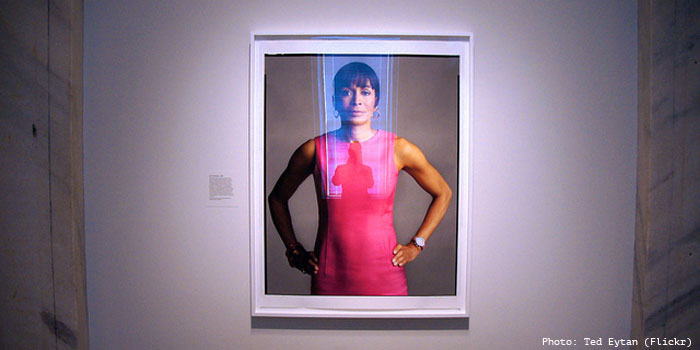
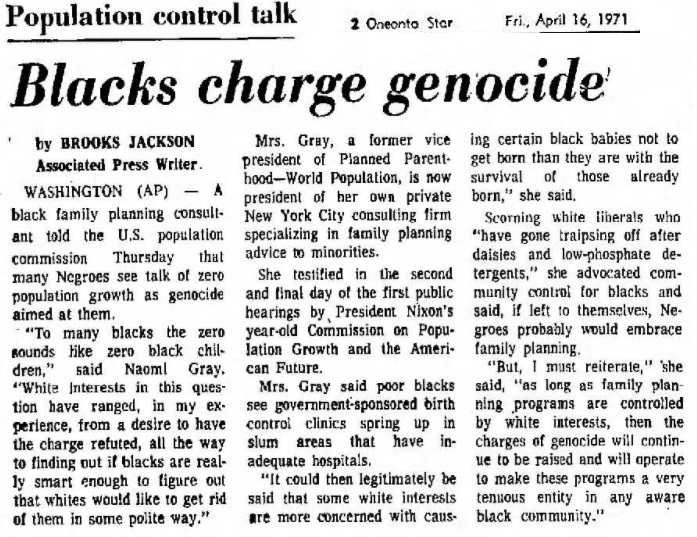
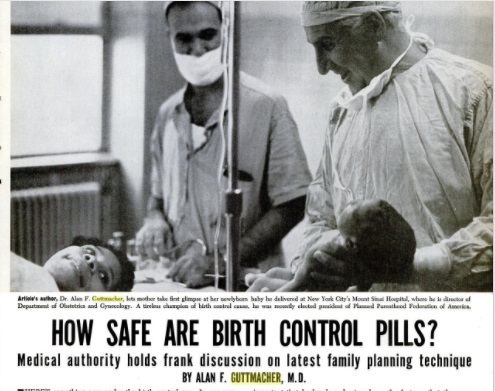
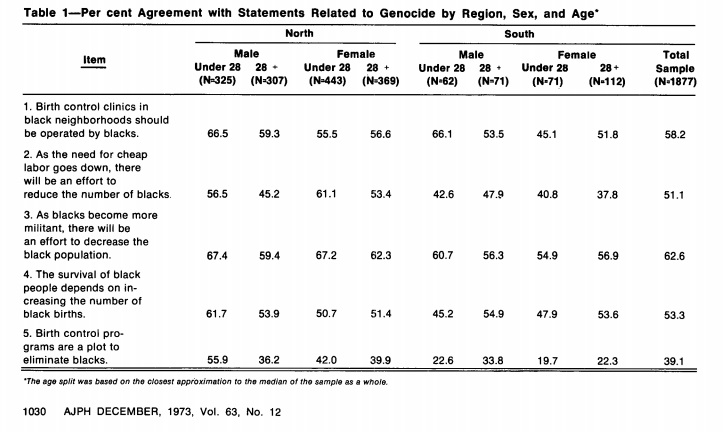

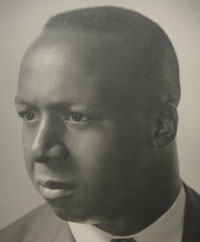
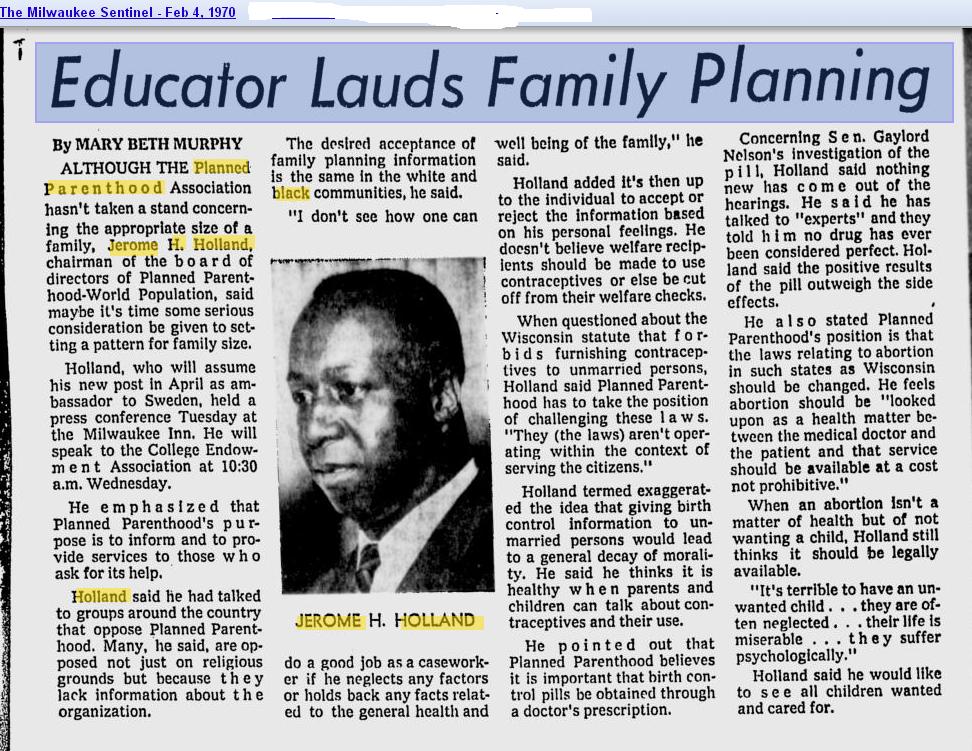
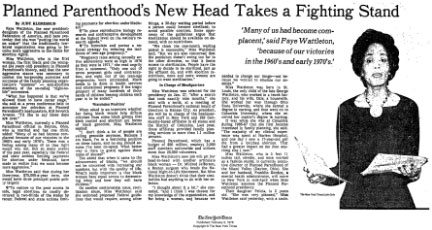
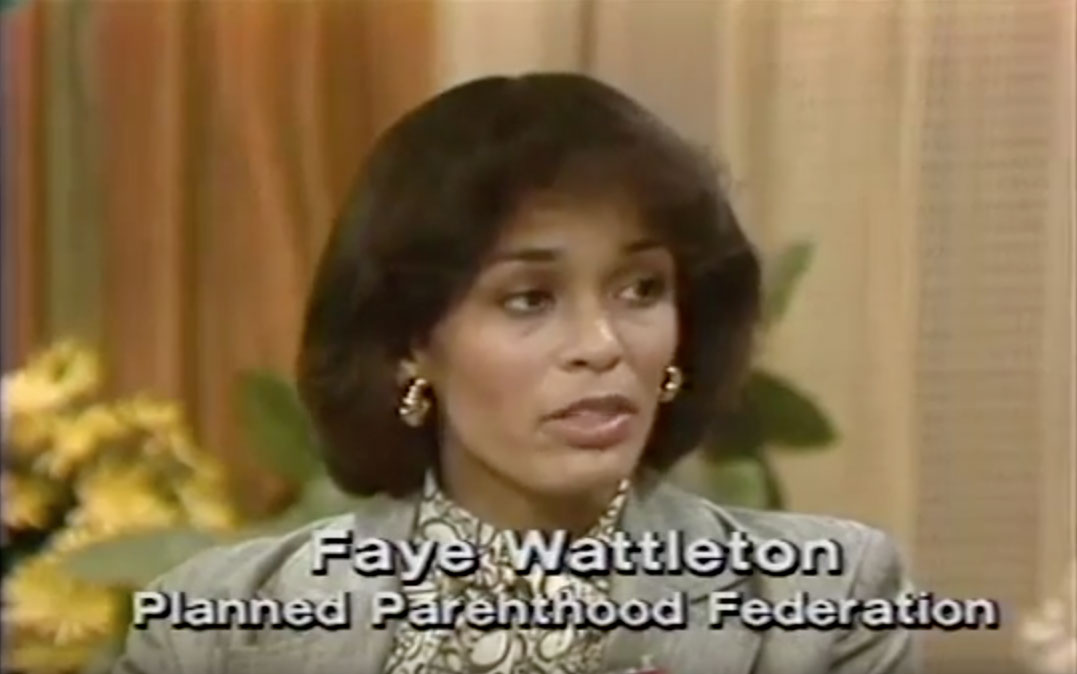



No comments:
Post a Comment